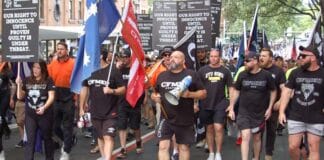THOUSANDS OF building workers across the country are set to strike on December 2, when Noel Washington, senior vice president of the Victorian branch of the CFMEU, goes on trial for two days in Geelong.
Noel has bravely defied the Australian Building and Construction Commission (ABCC), a Howard-era, anti-union relic.
Under the Howard laws, it an “offence” to refuse to be interrogated by the ABCC. Noel automatically faces six months jail if found guilty.
The ABCC and the special laws for the construction industry are among the most extreme of Howard’s anti-worker legislation. If the campaign to have it scrapped succeeds it will build pressure on Rudd to reverse the rest of the WorkChoices laws he is leaving in place too.
Job site meetings of the Victorian CFMEU have endorsed 24-hour strike action on the day of the trial. They will be joined by other building unions, such as the Electricians, Plumbers and the construction section of the manufacturing workers’ union.
But the demonstration also needs the support of as many unionists outside the construction industry as possible. This is a fight for all workers.
Unions are demanding that the Rudd government abolish the ABCC prior to the January 2010 extension given to this coercive and draconian body.
Even after that date Rudd refuses to abolish the ABCC but rather will make it a special division in his new industrial body—Fair Work Australia.
The ABCC’s powers after 2010 are being reviewed by Murray Wilcox, a former Federal Court judge. Wilcox’s review will be handed to Workplace Relations Minister, Julia Gillard, in March next year.
In an initial report released in October he acknowledged that the special laws in the building industry “treat building workers more harshly than people in other industries”, and questioned the need for its extreme powers of interrogation.
Evidence gathered by his review also shows that the commission’s main role is to police the construction unions: in the last two years 61 and 73 per cent respectively of its investigations were into trade union activities.
Further proof of this anti-union bias was given in October when a Federal Court judge slammed the ABCC for bringing a case on behalf of an employer the judge described as a “foul mouthed industrial cowboy”.
Although this employer had used sham arrangements to avoid paying tax and workers’ superannuation, the ABCC showed no interest in prosecuting him but instead tried to take the plumbers union to court for action they took against the employer. The commission was forced to withdraw the case and pay the union’s legal costs.
However Wilcox’s review accepts the idea that “lawlessness” is a genuine problem in the construction industry – yet fails to mention that this “illegal activity” consists mainly of basic union activities like the right to enter workplaces and to strike which the Howard government’s industrial relations regime made illegal.
The ABCC is consistently supported by the building companies because they support its anti-union agenda. In early October, Brian Welch, the head of the Master Builders Association of Victoria (MBAV), told the Melbourne Age that “intimidation” and “coercion” by unions had been “cleaned up” by the ABCC.
The ABCC has charged Noel Washington with new offences from industrial incidents going back two years. Welch said of these latest charges against Noel, “This alleged conduct is typical of the sort of behaviour that was routine in the days before the ABCC.”
What is typical is that the ABCC would choose to press new charges against Noel at a time when he already faces trial for defying the ABCC and that the MBAV would back the ABCC to the hilt.
The case is building to abolish the ABCC but only the pressure of sustained national strike action can keep Noel out of jail and make sure it is scrapped.
By a CFMEU member





